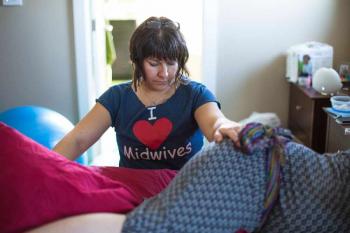Image Caption
By Andrea Smith
Windspeaker Contributor
EDMONTON
“A colonized birth is handing over trust of birth, not allowing traditions or ceremony to happen. And removing women from their communities… Basically it’s the stripping of traditions,” said Nadia Houle, an Aboriginal doula in the city of Edmonton.
Houle is undertaking a major venture in the New Year, putting together an Indigenous birth team so Aboriginal women can stay connected to their culture, and to themselves, during the birth process.
“Decolonization is bringing back those memories and traditions of how important it was for women to be with their families and to be supported how ever they need to be supported. And honoring the baby,” said Houle.
Contact with Europeans is what caused Aboriginal women to lose healthy birth traditions. As culture was suppressed, so were tried and true Indigenous birth practices. The loss of these practises had a detrimental effect on many women, and continues to now.
When women have to leave their communities or they aren’t allowed to give birth in a hospital in a way that makes them comfortable—with lots of visitors considered family members, or drumming or singing happening, for example—the result is that women feel alienated, unheard and uncared for. And it can also harm the baby, when births don’t go well for these reasons, said Houle.
Her birth team will include doulas, midwives, doctors, obstetricians, and Aboriginal Elders, and will open in early January.
“I think one big focus is creating support for women coming from out of community… Those women need support because maternal health is very important,” said Houle.
“We still need lots of feedback from the women of many communities, but the women we’ve heard from so far are excited and they’re glad something like this is being set up. Women who’ve had access to a midwife, or compassionate collaborative care speak highly about it,” she said
Elsie Paul is an Aboriginal Elder from the Edmonton area. She’ll be involved with Houle’s birth team, teaching traditional parenting classes. She also believes colonization had serious negative consequences for First Nations women and their babies, when it comes to birthing.
“We had our own practices and they got lost with assimilation and residential school. There’s spiritual teachings, and then there’s practical teachings… It isn’t just a moss bag,” said Paul, alluding to her favorite example of a tradition not often used now, but which had multiple benefits.
The moss bag, as Paul puts it, is a traditional practice in which a baby was placed into a bag filled with moss. It was done immediately after birth to help the baby transition from the warm, moist embrace of the mother’s womb, to the harsh world outside of it. The moss being equally warm and moist.
Paul recalls picking moss with her mother, then placing it on sticks to dry.
“I helped my mom pick the moss, but she didn’t explain it. It’s not her fault. She only got bits and pieces herself. She went to residential school… It’s really important we get to know the real meaning because everything is so symbolic and so spiritual and so beautiful with our culture,” she said.
The moss in the bag was used to keep the baby’s bottom clean, said Paul, and it was changed as frequently as you’d change a Pampers diaper. But when disposing of the moss, the baby’s spirit was also considered, said Paul, which is a crucial part of the Indigenous way of child-rearing, once lost, but now being revived.
“She never threw that soiled moss in the slop pail. We’d go out to the bush and spread it all around. She was doing a traditional thing returning the moss to Mother Earth,” she said. “Because why would we throw this moss in the garbage when the child has slept in it? It’s respecting the spirit of that child,” said Paul.
Evamarie Lema can vouch for the need for an Indigenous birth team. She’s a Cree woman, and a registered nurse in Edmonton. Lema has given birth twice—once in the hospital, and once at home, using the services of one of Houle’s doula coworkers.
“For my first birth… I didn’t feel like I was in control. I was in labour for 60 hours. I was getting bossed around and I was trying to advocate for myself,” said Lema.
“For my second birth… I had Heather Houle as my doula. She came over and supported me the way I imagine many doulas would… but some of the extra things she did was smudge the whole house with sweetgrass and sage,” said Lema.
Lema took only a few hours to give birth to her daughter, with just a few minutes of serious pushing involved. It took her a long time to heal from the trauma of her first birth, and the feelings of bliss and deep connection she felt with her culture, herself, and her child made the home birth more than worth it.
“With Josie I had a name picked out for her and after I met her… I was so happy to meet her… I thought of Josephine Ocean. Because I felt like such a greater connection to nature, and to being a woman,” said Lema.
For more information you can email Nadia at Indigenousbirthalberta@gmail.com or follow them on Facebook.

